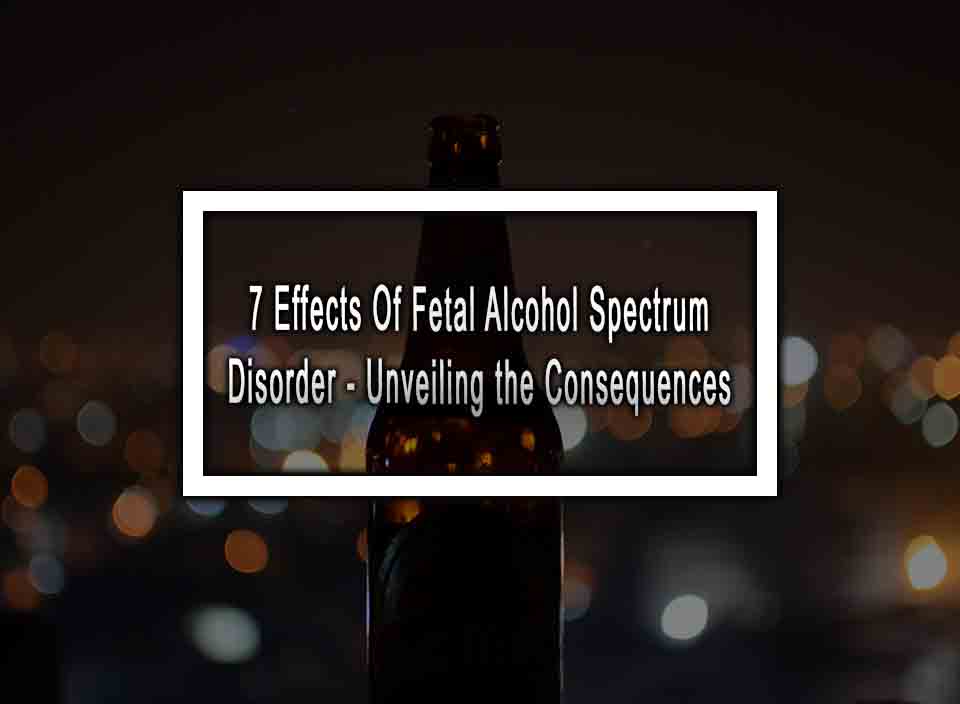Table of Contents
ToggleCheers or Tears? The Surprising Consequences of Fetal Alcohol Exposure
When it comes to maternal alcohol consumption during pregnancy, the impact can extend beyond immediate health risks. Fetal Alcohol Spectrum Disorder (FASD) encompasses a range of developmental issues that can affect children for life. In this eye-opening article, we uncover seven alarming effects of FASD – from physical abnormalities to cognitive impairments – that highlight the severity of this preventable condition.
1. Cognitive Challenges
Children with FASD often encounter a variety of cognitive challenges that can hamper their academic progress. From reduced attention spans to difficulties with memory retention, FASD can adversely affect a child’s ability to learn and perform well in educational settings.
2. Physical Abnormalities
One of the most apparent consequences of FASD is the presence of physical abnormalities. Facial malformations, such as a small head size or distinctive facial features, serve as telltale signs of prenatal alcohol exposure. Discover how these physical features can be life-altering for individuals with FASD.
3. Behavioral Issues
Individuals with FASD often face significant challenges in regulating their behavior and impulse control. Outbursts, difficulty following rules, aggressive tendencies, and impaired social skills are just a few of the behavioral issues associated with FASD. Explore how these difficulties can impact everyday life.
4. Sensory Processing Disorders
Sensory processing disorders can plague individuals with FASD, making it difficult for them to process sensory information effectively. Whether it’s sensitivities to light, sound, touch, or taste, these disorders can cause severe discomfort and impact their overall functioning.
5. Mental Health Concerns
FASD can significantly increase the risk of mental health disorders, including depression, anxiety, and ADHD. The combination of cognitive challenges, behavioral difficulties, and social isolation can contribute to a higher vulnerability to mental health struggles among those affected. Learn more about these silent battles.
6. Executive Functioning
Executive functioning, which encompasses skills like decision-making and problem-solving, can be severely impaired in individuals with FASD. We explore how these impairments can affect their independence and ability to navigate daily tasks as they grow older.
7. Social Challenges
Living with FASD often brings unique social challenges, including difficulty making friends, understanding social cues, and maintaining relationships. Explore the impact of these challenges on the emotional well-being of individuals with FASD and the importance of fostering inclusive communities.
Conclusion
Unveiling the startling effects of Fetal Alcohol Spectrum Disorder sheds light on the urgency for prevention and support. By understanding the range of challenges faced by individuals with FASD, we can work towards creating a more inclusive society that embraces and supports those affected. It’s time to move from awareness to action, prioritizing education, prevention, and empathy to ensure a brighter future for all.
Fetal Alcohol Spectrum Disorder FAQ
Here are the most common questions about fetal alcohol spectrum disorder.
1. How does alcohol affect a developing fetus?
Alcohol can reach the developing fetus through the placenta, causing damage to the developing brain and other organs. The severity of the damage depends on the amount and frequency of alcohol consumption during pregnancy.
2. What are the common symptoms of Fetal Alcohol Spectrum Disorder?
Common symptoms of FASD include facial abnormalities, growth deficiencies, learning disabilities, intellectual disabilities, attention deficit hyperactivity disorder (ADHD), poor impulse control, and difficulties with social interactions and behavior.
3. Can Fetal Alcohol Spectrum Disorder be diagnosed?
Yes, FASD can be diagnosed through a comprehensive evaluation by a team of medical professionals, including a physician, psychologist, and occupational therapist. The evaluation includes physical examinations, interviews with the child and parents, and assessments of cognitive and behavioral functioning.
4. Is Fetal Alcohol Spectrum Disorder curable?
FASD is not curable, but early intervention and appropriate support can greatly improve the outcomes for individuals with FASD. This may include individualized education plans, behavioral therapy, speech therapy, occupational therapy, and medication management.
5. How common is Fetal Alcohol Spectrum Disorder?
The exact prevalence of FASD is difficult to determine, as it can vary across different populations and regions. However, it is estimated that FASD affects about 1 in 100 individuals in the general population.












